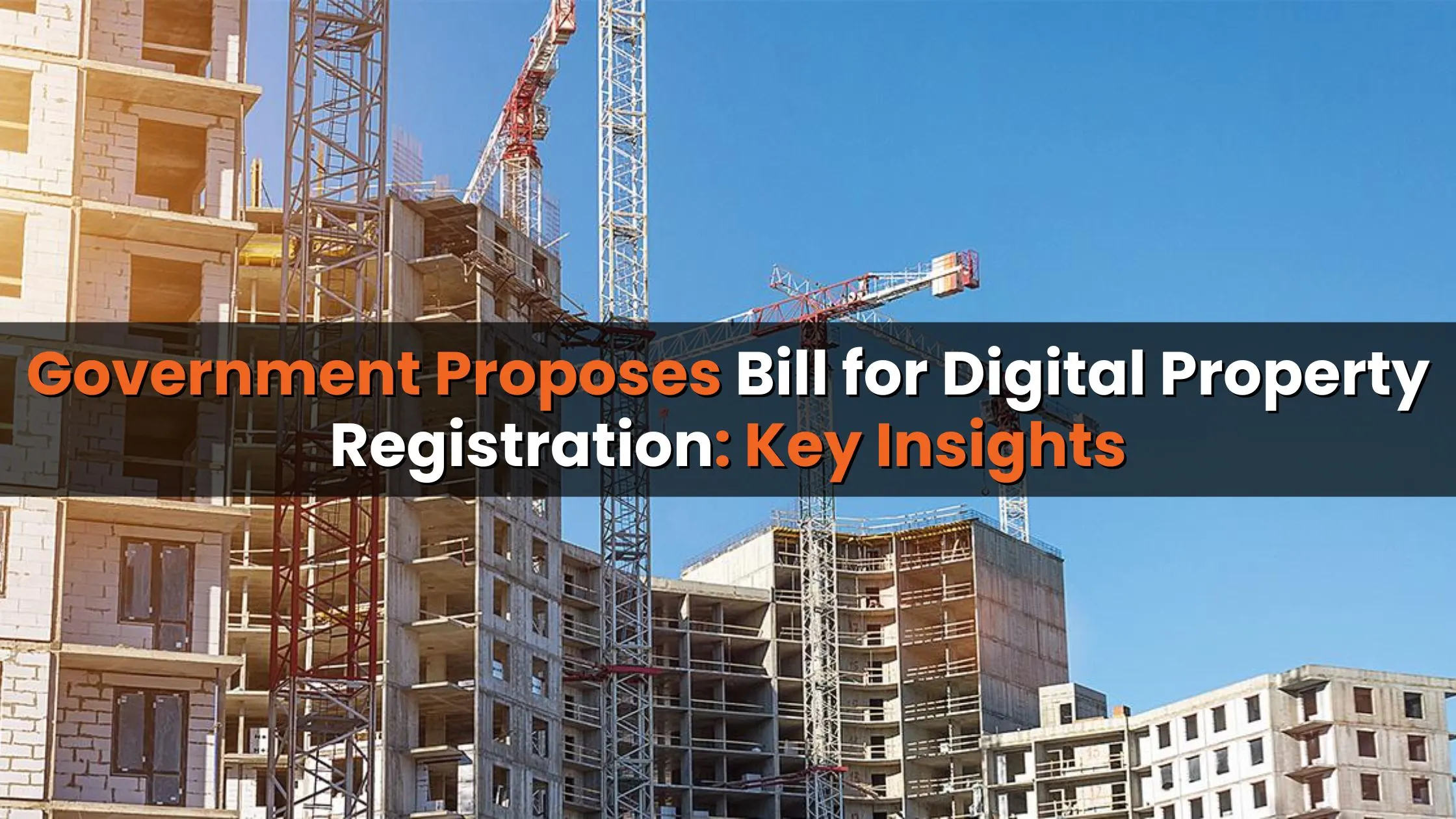Table of Content
▲
With the unveiling of The Registration Bill, 2025, a monumental initiative to reform property registration processes and practices, the Indian government is poised to revolutionize the real estate sector. The Department of Land Resources, Union Ministry of Rural Development, developed the bill, which supersedes the year-old Registration Act of 1908. The bill to be introduced proposes a digital-first approach to create transparency, efficiency, and accessibility to meet the needs and expectations of modern businesses, citizens, and the solar system.
This article will address the various elements, implications, and disruptive possibilities of The Registration Bill, 2025, and its significance to the different interested parties.
Key Highlights of The Registration Bill 2025
1. Online Property Registration
An essential aspect of the Bill is its move toward a paperless, digital property registration system. It will be possible for persons to carry out property transfers electronically eliminating the necessity of a visit to the registration office. This change aims to:
- Save time and reduce logistical challenges.
- Minimize reliance on intermediaries.
- Enhance convenience for individuals and businesses.
The inclusion of digital processes underscores the government’s commitment to leveraging technology for public benefit.
Also Read: Beyond the Metros: Tier II Cities Redefining India's Commercial Real Estate Boom
2. Expanded Scope of Mandatory Registration
The Bill significantly broadens the range of documents that require compulsory registration. This includes:
- Agreements to sell.
- Powers of attorney.
- Sale certificates issued by competent authorities.
- Equitable mortgage arrangements.
- Documents related to court orders.
By expanding the scope of mandatory registrations, the Bill enhances legal clarity and ensures comprehensive documentation of property-related transactions.
3. Aadhaar-Based and Alternative Verification
The Bill incorporates modern verification methods while maintaining inclusivity. Citizens can opt for Aadhaar-based authentication, ensuring a streamlined process for those who possess the identification. At the same time, alternative verification mechanisms are provided for individuals who either do not have Aadhaar or prefer not to use it.
4. Integration with Digital Records
The Bill facilitates electronic integration with other digital record-keeping systems, ensuring seamless information flow. This integration improves data reliability and supports better governance.
5. Electronic Presentation and Documentation
Under the new provisions, documents can be presented either physically or electronically. Signatures, photographs, and thumb impressions can be submitted manually or digitally, adding flexibility to the registration process.
Benefits of The Registration Bill 2025
For Homebuyers
Homebuyers are one of the main beneficiaries of The Registration Bill 2025. The digital-first approach to registration removes the need for physical attendance and intermediaries, so homebuyers can expect:
- Faster processing of property documents.
- Greater transparency in transactions.
- Enhanced protection against fraudulent activities.
For Developers
Real estate developers will benefit from streamlined approval processes and digital record integration. The Bill ensures that:
- Documentation and approvals are processed more efficiently.
- Projects experience fewer delays due to administrative bottlenecks.
- Developers can maintain better compliance with legal standards.
For Governments
The Bill empowers governments at various levels by creating a harmonized framework for property registration. Key benefits include:
- Enhanced monitoring and enforcement capabilities.
- A reduced scope for fraud due to electronic trails.
- Improved governance through real-time access to transaction data.
Addressing Challenges in Property Registration
While The Registration Bill 2025 introduces transformative changes, its implementation will require addressing several challenges:
Fraud Prevention
To curb potential misuse, the Bill includes provisions for physical verification of individuals and documents in specific cases. This measure aims to maintain the integrity of the registration process while preventing fraudulent transactions.
Appeal Mechanisms
The Bill provides precise conditions of when a registration may be declined along with a process to review such decisions. This provides clarity to citizens and ensures that disputes are resolved fairly.
Training and Awareness
To ensure the successful implementation of the Bill, it will be vital to:
- Train government officials on the new digital processes.
- Educate citizens and stakeholders about the changes.
- Address technical challenges and ensure the reliability of online platforms.
Expert Opinions on The Registration Bill 2025
The Registration Bill 2025 has been praised by legal and industry experts for the potential future impact it can have.
Venkat Rao, founder of Intygrat Law Offices, acknowledged the Bill positively, saying it addresses long-term public concerns regarding transparency and fraud prevention, but also highlighted that the success of the Bill would rely on a good digital infrastructure for implementation.
Ketan Mukhija, senior partner at Burgeon Law, commended the Bill's inclusivity, too, referencing the dual verification options and being able to adapt to modern transaction practices. He remarked that it would also benefit buyers and developers to create a more efficient and secure real estate ecosystem.
Future Implications of The Registration Bill 2025
The proposed legislation has the potential to set a new benchmark for property registration systems worldwide. By leveraging technology and emphasizing citizen-centric solutions, the Bill aims to:
- Foster trust in the real estate sector.
- Reduce bureaucratic inefficiencies.
- Encourage investment by creating a transparent and reliable framework.
Furthermore, the Bill’s provisions for Aadhaar-based verification, electronic documentation, and digital record maintenance align with India’s broader vision of digital transformation.
Also Read: Bengaluru's Priciest Penthouse Sold: A ₹54 Crore Real Estate Milestone
Conclusion
India's property registration system is set to undergo a radical modernization with the Registration Bill 2025. It satisfies the demands of a dynamic real estate market thanks to its emphasis on digital procedures, increased document coverage, and strong verification techniques.
Stakeholders, such as residents, developers, and legal professionals, should actively participate in the consultation process while the Bill awaits public input. India can create a property registration system that is not only effective but also fair and transparent by improving the suggested framework and resolving any possible issues.
This legal innovation might facilitate property transactions, increase trust in the real estate industry, and open the door to a more technologically empowered and inclusive future.
Follow AquireAcers Whatsapp Channel to Stay Updated With The Latest Real Estate News







_1771410929.webp)
Ans 1. The Registration Bill 2025 is a proposed legislation by the Indian government to modernize property registration processes by adopting a digital-first approach, replacing the Registration Act of 1908.
Ans 2. Online property registration. Expanded scope of mandatory document registration. Aadhaar-based and alternative verification methods. Integration with digital records for seamless data flow. Flexibility in document presentation, including electronic submissions.
Ans 3. Homebuyers can enjoy faster processing, reduced reliance on intermediaries, and enhanced protection against fraud.
Ans 4. Developers will benefit from streamlined approval processes, better compliance mechanisms, and reduced administrative delays.
Ans 5. By integrating property transactions into digital systems, it creates electronic trails and minimizes fraudulent activities.
Ans 6. The Bill allows for physical verification of individuals and documents in certain cases and includes provisions for appeal mechanisms if registrations are declined.
Ans 7. Ensuring robust digital infrastructure. Preventing technical issues and system downtimes. Training officials and educating citizens about the new processes.
Ans 8. Legal and industry experts commend the Bill for addressing transparency and fraud prevention while emphasizing the importance of reliable digital infrastructure for its success.
Ans 9. Citizens can use Aadhaar for streamlined property registration. However, alternative verification options are available for those without Aadhaar or those who prefer not to use it.
Ans 10. The Bill aims to foster trust in the real estate sector, reduce bureaucratic inefficiencies, and encourage investments by creating a transparent and reliable registration framework.